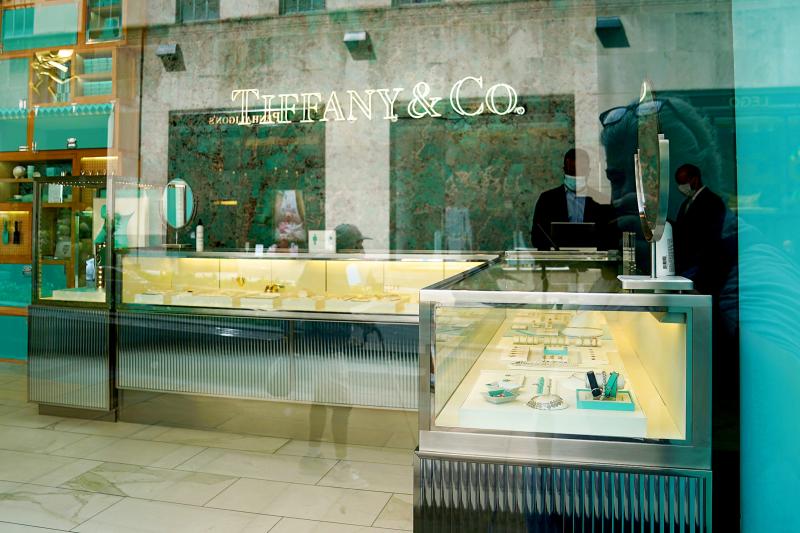Tiffany & Co’s board approved an agreement to revive its sale to LVMH, people familiar with the matter said, giving the French luxury conglomerate a US$425 million discount from the original price.
The Paris-based company would pay US$131.50 per share for the US jeweler, down from the original US$135, the people said.
The total cost of the original agreement was about US$16 billion.

Photo: Reuters
Tiffany sought about US$132 per share as a compromise price, Bloomberg News reported on Tuesday, citing people familiar with the matter.
The jeweler also likely wanted a guarantee that LVMH would not back out of any revised deal, after the Louis Vuitton owner said last month that it could not complete the acquisition because of a French government request.
Tiffany shares on Wednesday erased losses, rising 0.8 percent to US$129.95 in New York trading.
Representatives for the jeweler and LVMH declined to comment.
The compromise ends a year-long saga involving a bitter war of words, French government intervention and lawsuits in the US.
By striking a new deal, the companies can avoid a courtroom battle that was set for January in Delaware, but the original deal’s closing date of Nov. 24 is not to be met, a person familiar with the matter said.
The relationship between Tiffany and LVMH started affably last year following a short courtship, with the jeweler hosting LVMH chairman Bernard Arnault and his top brass at its New York flagship store.
France’s wealthiest man spoke of Tiffany as an American icon and expressed his “intense respect and admiration” for the business.
The smiles soon faded after the COVID-19 pandemic sparked worldwide economic turmoil and roiled the global luxury market. LVMH got a helping hand from the French government when its foreign minister sent a letter asking the company to delay the deal amid a trade dispute with the US.
That sparked a Tiffany lawsuit, followed by an LVMH countersuit in which it accused the jeweler’s executives of mismanaging the business during the pandemic.
Tiffany persuaded a judge to fast-track its suit and the two sides reopened talks as the original closing date approached.

CAUTIOUS RECOVERY: While the manufacturing sector returned to growth amid the US-China trade truce, firms remain wary as uncertainty clouds the outlook, the CIER said The local manufacturing sector returned to expansion last month, as the official purchasing managers’ index (PMI) rose 2.1 points to 51.0, driven by a temporary easing in US-China trade tensions, the Chung-Hua Institution for Economic Research (CIER, 中華經濟研究院) said yesterday. The PMI gauges the health of the manufacturing industry, with readings above 50 indicating expansion and those below 50 signaling contraction. “Firms are not as pessimistic as they were in April, but they remain far from optimistic,” CIER president Lien Hsien-ming (連賢明) said at a news conference. The full impact of US tariff decisions is unlikely to become clear until later this month

With an approval rating of just two percent, Peruvian President Dina Boluarte might be the world’s most unpopular leader, according to pollsters. Protests greeted her rise to power 29 months ago, and have marked her entire term — joined by assorted scandals, investigations, controversies and a surge in gang violence. The 63-year-old is the target of a dozen probes, including for her alleged failure to declare gifts of luxury jewels and watches, a scandal inevitably dubbed “Rolexgate.” She is also under the microscope for a two-week undeclared absence for nose surgery — which she insists was medical, not cosmetic — and is

GROWING CONCERN: Some senior Trump administration officials opposed the UAE expansion over fears that another TSMC project could jeopardize its US investment Taiwan Semiconductor Manufacturing Co (TSMC, 台積電) is evaluating building an advanced production facility in the United Arab Emirates (UAE) and has discussed the possibility with officials in US President Donald Trump’s administration, people familiar with the matter said, in a potentially major bet on the Middle East that would only come to fruition with Washington’s approval. The company has had multiple meetings in the past few months with US Special Envoy to the Middle East Steve Witkoff and officials from MGX, an influential investment vehicle overseen by the UAE president’s brother, the people said. The conversations are a continuation of talks that

CHIP DUTIES: TSMC said it voiced its concerns to Washington about tariffs, telling the US commerce department that it wants ‘fair treatment’ to protect its competitiveness Taiwan Semiconductor Manufacturing Co (TSMC, 台積電) yesterday reiterated robust business prospects for this year as strong artificial intelligence (AI) chip demand from Nvidia Corp and other customers would absorb the impacts of US tariffs. “The impact of tariffs would be indirect, as the custom tax is the importers’ responsibility, not the exporters,” TSMC chairman and chief executive officer C.C. Wei (魏哲家) said at the chipmaker’s annual shareholders’ meeting in Hsinchu City. TSMC’s business could be affected if people become reluctant to buy electronics due to inflated prices, Wei said. In addition, the chipmaker has voiced its concern to the US Department of Commerce